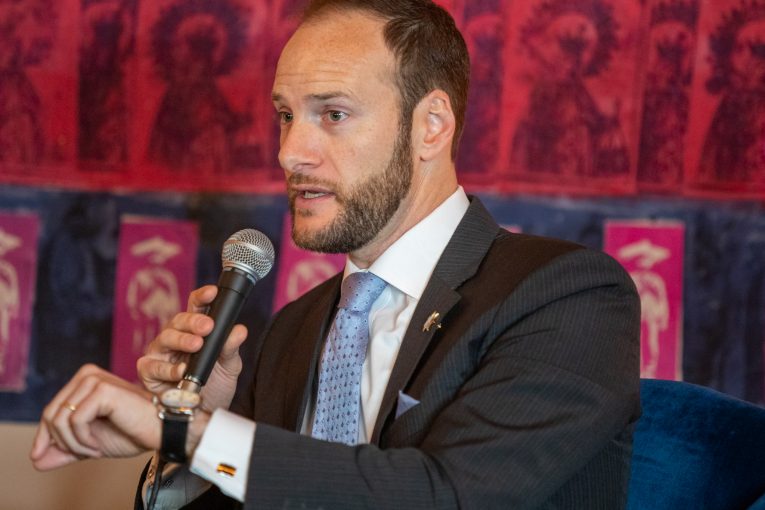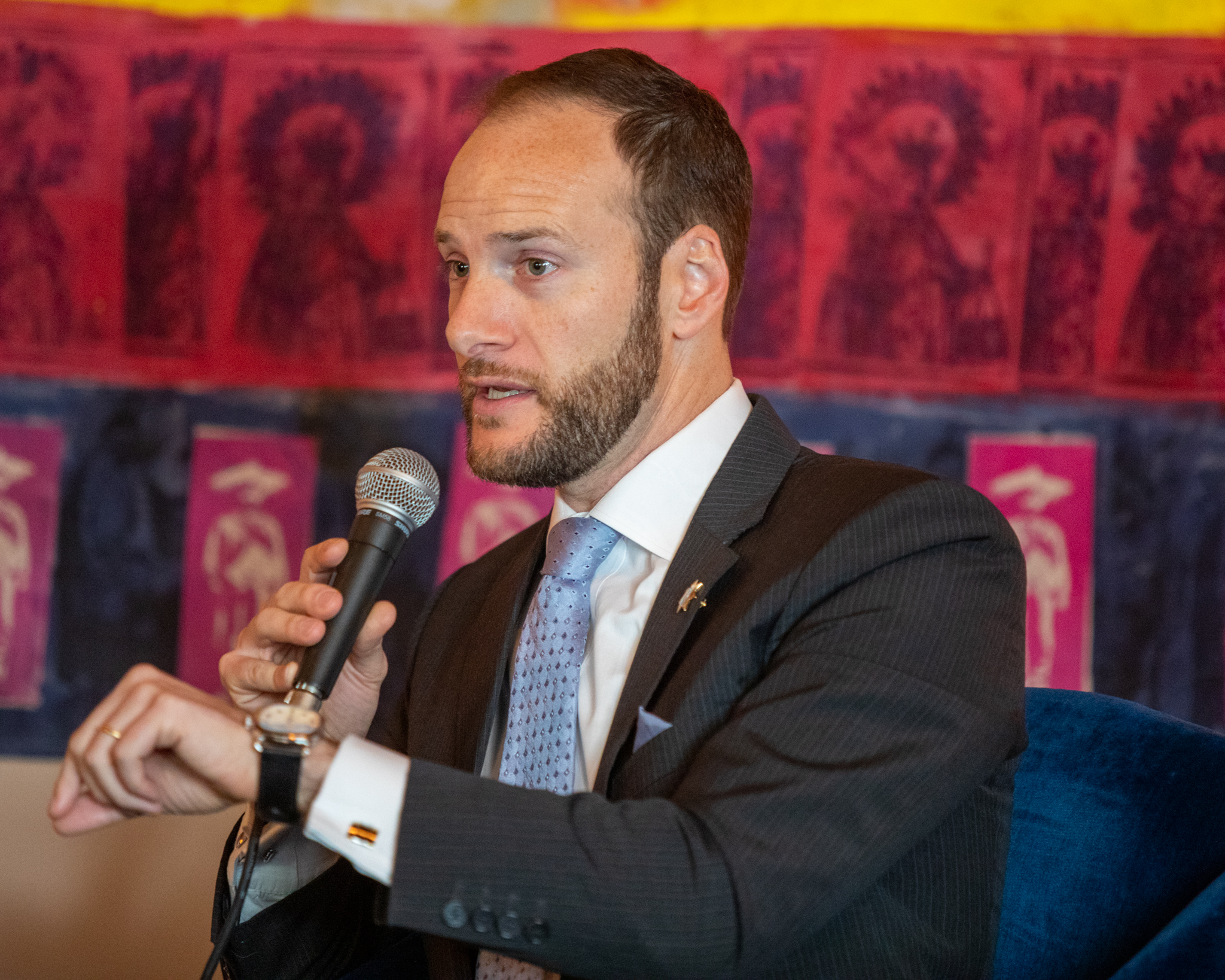

By Evie Sun and Cailin Garcia
MANHATTAN, NY — Congregation Beit Simchat Torah (CBST) hosted a webinar over Zoom and Facebook live to discuss mass incarceration and racial injustice in the criminal justice system this week, and they were joined by two prominent figures in the social justice community: San Francisco District Attorney Chesa Boudin and former prosecutor Miriam Krimsky.
CBST is a spiritual community based in New York that prides itself on being a “progressive voice within Judaism.” The community advocates for many social justice issues, especially those concerning human rights. This webinar was hosted by CBST’s social justice team.
“Our team has had three goals. One is to educate ourselves about these issues. The second is to advocate for change. And the third is to serve, and to do that by volunteering to help people and their families who have been incarcerated and are now returning to our communities,” said Laurie Magid, one of the leaders of CBST’s social justice team.
Boudin has a unique perspective as a prosecutor who previously worked as a public defender and whose parents were both incarcerated when he was a child. He was elected as San Francisco DA last year after running a campaign based on addressing criminal and racial justice issues, including promises to end cash bail and make sentencing fair for everyone.
Krinsky is the founder and executive director of Fair and Just Prosecution, an organization that brings together newly-elected local prosecutors as part of a network of leaders committed to promoting a justice system grounded in fairness, equity, compassion, and fiscal responsibility.
“I’ve felt that in the criminal justice arena, that too many at a national level have tried to bring us back to a tough-on-crime, punish our way out of every societal problem stance that presumes that the right response to homelessness or individuals struggling with mental illness or substance use disorders is to incarcerate or jail our way out of it,” said Krinsky.
“I’m so delighted for us to lift up Chesa as a model and one of the best of this bold new generation of leaders,” Krinsky continued.
“I thought we could start with you talking about your very unusual journey to this work. Like some other elected prosecutors we work with, you never spent a day as a prosecutor before you walked through the doors as the elected DA. And you also bring a personal experience having seen the worst of the criminal justice system up close,” Krinsky finished, introducing Boudin as the next speaker.
When Boudin was just 14 months old, his parents left him with a babysitter while they participated in an armed robbery for a militant political group. His mother went on to serve 22 years in prison for that crime and his father, now 75 years old, is still incarcerated. Boudin explained that his childhood has been a large influence on his feelings about the role of prosecutors.
“My earliest memories are going through steel gates and metal detectors just to be able to see my parents, just to be able to touch them or hug them,” said Boudin.
“My whole life, I have seen first-hand the ways in which our approach to crime and punishment, our system, which has become appropriately known as one of mass incarceration, is failing to serve the needs of our communities. It’s failing to rehabilitate people who have caused harm. It’s to support healing and uplifting of victims who have been harmed by crime,” he continued.
Boudin went on to discuss new policy reforms that he announced earlier this year in late February, which decline to assign prior convictions as enhancements.
He explained, “It says that we’re going to prosecute people and hold them accountable for what they did, not for what they were previously punished for, not for the neighborhood they grew up in, or who they associate with.”
When asked what he sees as the biggest challenge facing the criminal justice system, Boudin responded, “The biggest challenge is the lack of effective alternatives and the lack of investment in an alternative. We really need to build out things that are more directly addressing root causes of crime.”
“We need to have more investment in the kinds of alternatives that are really directly correlated with the behavior that leads people to get arrested in the first place, and that investment needs to include healing and supporting crime victims,” said Boudin.
Boudin also emphasized the importance of re-entry bureaus and post-conviction centers in aiding the formerly-incarcerated in the process of re-integrating into society. He spoke of his mother’s experience, who was released on parole supervision after 22 years in prison.
“People need support, they need skills, and they need a helping hand — especially people who weren’t able to make it successfully before they got into prison. Those are folks who obviously had challenges to begin with, whether it be mental health or substance use. San Francisco County Jail traditionally releases people at 10 p.m. or later without easy access to public transportation, with easy access to drugs, after homeless shelters are closed,” said Boudin.
After Boudin spoke, Krinsky discussed the implications of the criminal justice system on the U.S. foster care system and the school-to-prison pipeline.
“At the end of the day, if parents are struggling, we should be doing everything that we can to help those parents cope — to support them, to provide them with everything they’re lacking,” said Krinsky.
“When people are struggling, we put them in jail. We criminalize their struggle, rather than investing in housing, social support, or substance abuse treatment, which can fortify the family and fortify what the individual is trying to cope with. We know the outcomes are better if we invest in those proactive preventions,” she continued.
To conclude, Boudin was asked what gives him hope for a better future in regards to criminal justice reform.
“What gives me hope is the amazing work that is happening all around the Fair and Just Prosecution network … people who are deeply committed to justice, who draw on faith, who draw on personal life experience, who draw on the individual people in their communities. The policies that we write, the laws that we change make a difference in real people’s lives every single day,” he answered.
 Cailin Garcia is a senior at UCLA, majoring in sociology with a minor in professional writing. She is from Santa Clarita, California.
Cailin Garcia is a senior at UCLA, majoring in sociology with a minor in professional writing. She is from Santa Clarita, California.
Evie Sun is a third-year student at UCLA, studying Sociology. She is from the East Bay Area.
To sign up for our new newsletter – Everyday Injustice – https://tinyurl.com/yyultcf9
Support our work – to become a sustaining at $5 – $10- $25 per month hit the link: